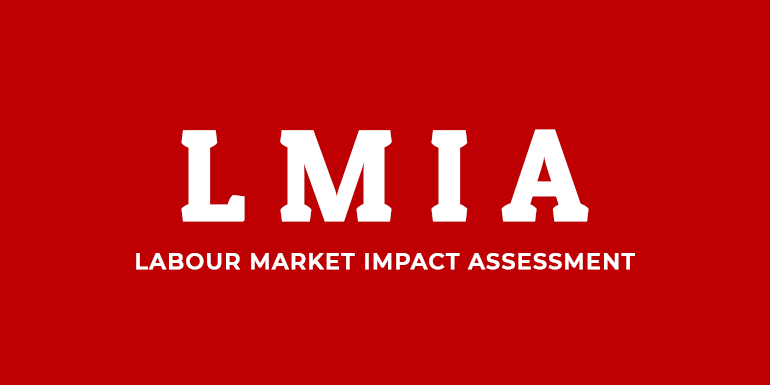LMIA
If you're finding it difficult to hire the right talent for your business due to a labour shortage or lack of availability of Canadian citizens and/or permanent residents, the Temporary Foreign Worker Program (TFWP) may be a solution for you. This program allows Canadian employers to hire foreign workers on a temporary basis when no Canadian worker is available to fill the job vacancy. The TFWP is jointly administered by Employment and Social Development Canada (ESDC) and Immigration, Refugees and Citizenship Canada (IRCC). To hire a temporary foreign worker, Canadian employers must obtain a Labour Market Impact Assessment (LMIA) from Employment and Social Development Canada (ESDC)/Service Canada showing that there is a need for a foreign worker to fill the job and no Canadian worker is available to do the job. The LMIA is designed to ensure that foreign workers are not being chosen over Canadian citizens and/or permanent residents who are qualified for the job. A positive LMIA means that hiring foreign nationals in the specified occupation and at the specified work location is likely to have a positive or neutral impact on the Canadian labour market.
The process

LMIA pathways/streams
- High-Wage Positions
- Low-Wage Positions
- Agriculture Stream
- Permanent residency
- Global Talent Stream
- In-home Caregiver/Nanny
- Owner Operator LMIA
Documents required for an LMIA application
LMIA application(s) can be different depending on the type of business/industry, business location, and the foreign worker they are looking to hire. Following is a generic checklist for reference:
- The LMIA rules, regulations and requirements are subject to frequent changes. These changes deal with different categories of jobs, duration, exemptions etc. Continuous research, attention to detail and painstaking hard work is required to obtain a positive LMIA. We help in assessment of our client’s profile and advice them on their eligibility to get an LMIA.
- We also assist our clients/employers with the advertisement posting.
- We help Canadian employers for applying Labour Market Impact Assessment (LMIA) application and legally representing them before ESDC during the procedure.
- Copy of advertisement and information to demonstrate where, when and for how long the position was advertised.
- Business registration or legal Incorporation documents (if first LMIA application). This does not apply to employers of In-home Caregivers.
- Provincial/municipal business license (where applicable and if first LMIA application). This does not apply to employers of In-home Caregivers.
- Canada Revenue Agency (CRA) documents: T2 Schedule 100 Balance Sheet Information and T2 Schedule 125 Income Statement Information (for corporations). These are only required if this is the employer’s first LMIA application. This does not apply to film and entertainment or employers of In-home caregivers.
- Provincial/territorial workplace safety and insurance (e.g. workers compensation board) clearance letter/certificate (if applicable).
- Attestations (if required) from a lawyer or Chartered Professional Accountant (CPA) in good standing with a law society or respective professional body. Attestations from Chartered Accountants in Quebec are not authorized by the Ordre des comptables professionnels agréés du Québec.
- Commercial lease agreement (where applicable). This does not apply to employers of In-home Caregivers.
- Film and Entertainment: Copy of employment contract (except film and TV).
- Provincial documentation requirements
British Columbia: Employment Agency License (British Columbia’s Employment Standards Act) if applicable
Alberta: Employment Agency Business Licence (Alberta’s Fair-Trading Act) if applicable.
Manitoba: Certificate of Registration (Manitoba’s Worker Recruitment and Protection Act).
Saskatchewan: Employer Registration Certificate (The Foreign Worker Recruitment and Immigration Services Act) (no documentation required; however, employers must be registered).
Nova Scotia: Employer Registration Certificate (Labour Standards Code).
LMIA application processing times
The processing times are averaged across all processing centres in Canada. Timelines represent the average time it takes to process an application from when it is received by Service Canada to when the decision is made on the application.
| LMIA Stream | Processing Time |
|---|---|
| Global Talent Stream | 1-2 Weeks |
| Agricultural stream | 1-3 Weeks |
| Seasonal Agricultural Worker Program | 1-2 Weeks |
| Permanent residence stream | 3-4 Months |
| In-home caregivers | 3-4 Weeks |
| High-wage stream | 2-3 Months |
| Low-wage stream | 2-3 Months |
Global Talent Stream and applications that qualify for expedited service have a service standard of 10-business days that is expected to be met 80% of the time. The service standard date starts on the business day after the application has been received.
Documents required for an LMIA application
LMIA application(s) can be different depending on the type of business/industry, business location, and the foreign worker they are looking to hire. Following is a generic checklist for reference:
- The LMIA rules, regulations and requirements are subject to frequent changes. These changes deal with different categories of jobs, duration, exemptions etc. Continuous research, attention to detail and painstaking hard work is required to obtain a positive LMIA. We help in assessment of our client’s profile and advice them on their eligibility to get an LMIA.
- We also assist our clients/employers with the advertisement posting.
- We help Canadian employers for applying Labour Market Impact Assessment (LMIA) application and legally representing them before ESDC during the procedure.



